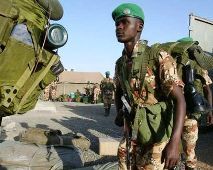Darfur’s green berets take pride in African Union mission
By Andrew England
AL-FASHER, Sep 25, 2004 (Financial Times) — Inside an air-conditioned office at the African Union’s headquarters in Sudan, a rebel commander sits next to a Sudanese military officer. On a nearby wall hangs a “situation map” of the troubled Darfur region their forces have been fighting over.
 Another insurgent is seated at the opposite end of the table, while in the middle the imposing figure of Colonel George Niouky, acting chairman of the African Union mission (AMIS), takes centre stage. The rebel and government representatives exchange glances and the odd word as Col Niouky fields questions from a Canadian delegation keen to understand Darfur.
Another insurgent is seated at the opposite end of the table, while in the middle the imposing figure of Colonel George Niouky, acting chairman of the African Union mission (AMIS), takes centre stage. The rebel and government representatives exchange glances and the odd word as Col Niouky fields questions from a Canadian delegation keen to understand Darfur.
All the military men, the rebels included, are in uniform and wear armbands emblazoned with the AU logo.
But it is the AU officers who do the talking. This is their operation.
Since the AU flag was first hoisted at the camp in al-Fasher on June 9, soldiers from 12 African nations have come together in Darfur, donning AU green berets in the hope of achieving a common goal – Africans solving an African problem.
“For the problem of harmonising us, we military have spirit, the esprit de corps,” says Col Niouky when asked how the soldiers from different countries get along.
As the Senegalese colonel speaks, young Rwandans armed with AK-47s guard the front gate, while off-duty Nigerians relax in canvas tents.
The observer mission has no mandate to intervene to protect civilians caught up in a brutal conflict that has made 1.4m people homeless and killed thousands, causing the US to declare it genocide.
But at least within the confines of the AU camp, rebels and government officers give the impression of working together, despite continued reports of attacks and skirmishes in the surrounding countryside.
The rebellion, led by members of Darfur’s African tribes, erupted in February 2003 and incited a brutal response from the government, which is alleged to have armed and supported Arab militia accused of conducting a campaign of ethnic cleansing.
AMIS was launched after the government and two rebel groups – the Justice and Equality Movement and the Sudan Liberation Army – agreed to a “humanitarian ceasefire” in April.
Its mission is to monitor the accord and help build confidence between the belligerents.
In camps like al-Fasher, one of six in the region, AMIS has succeeded in getting the insurgents and government forces together. The two rebels, one from each group, and the government officer listening to Col Niouky are part of AU teams set up to investigate ceasefire violations. A representative of each party signs every report detailing a violation, whether the alleged aggressors are government or rebel forces.
But despite the seemingly cordial atmosphere in this camp, a political solution to the crisis remains distant. Reports of fresh violence arrive on a daily basis. Some are handwritten letters from villagers, others sent by government or rebel officials.
Pressure is mounting both within the 53-member AU and outside for an increase in AMIS’ size and mandate.
At present, there are about 135 military observers and a 300-strong protection force on the ground, a tiny presence in a region the size of France. Both Kofi Annan, UN secretary general, and Colin Powell, US secretary of state, have called for more monitors.
Meanwhile, the troops on the ground struggle against huge logistical challenges to carry out even their restricted current mandate, as the politicians discuss what to do next.
“We are not interested by what people are talking about outside. We have our mission and until the mission changes we do the same,” Col Niouky tells the FT, as Ghanaian, Kenyan and South African officers wander between offices.
In tents set up by Pacific Architects and Engineers (PAE), an American company contracted by the US administration, others speak of their pride about being involved in the operation.
“This is a great moment for Nigeria, this is a great moment for Sudan and it is a great moment for the African Union,” says Lieutenant Colonel Abiodun Oluwadare, a Nigerian commander. “It is critical for the image of Africa.”
English and French dictionaries lie on Col Oluwadare’s steel bed. He wants to use his time with French-speaking African opposite numbers to learn the language.
For the Rwandans, the mission has a deeper resonance. When genocide occurred in their country in 1994, nobody intervened and 800,000 people were slaughtered in 100 days. A UN force deployed at the time of the massacre was prevented from intervening and reduced in numbers at the height of the killings.
A more robust mission could have saved thousands of lives, says Major Emmanuel Rugazoora, a Rwandan commander.
